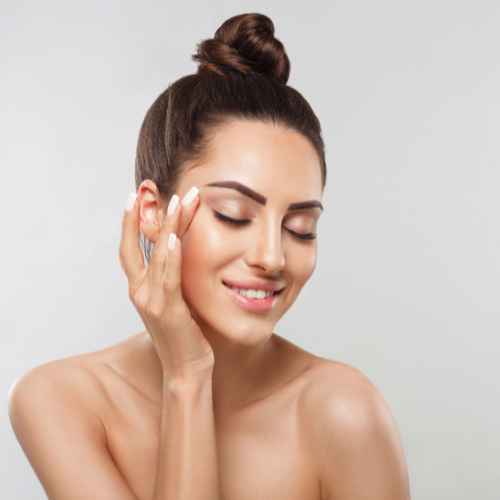There is so much misinformation about what is good or bad for the skin. This article will help you understand some of the practices you can incorporate into your daily routine to enhance your skin quality.
Remember, unless you are receiving treatment, there is no quick fix; even then, it can take time. Your dietary habits were built up over a long period and contributed to your skin quality or conditions, so it will naturally take some time to correct.
The good news is that optimising your diet for skin quality is natural, it works and you will feel good about making lifestyle changes that compliment your beauty.
But first, let’s take a closer look at what the skin is and how it works.
Your biggest organ
The skin is the largest organ of the human body and serves as a crucial barrier protecting us from environmental harm. Structurally, your skin is composed of three primary layers:
- The epidermis
- The dermis
- And, subcutaneous tissue
The outermost layer, the epidermis, acts as a shield against pathogens, chemicals, and physical abrasions. It also contributes to the regulation of moisture loss from the body.
Beneath the epidermis, the dermis contains connective tissue, blood vessels, nerve endings, and hair follicles, making it responsible for thermoregulation and sensation.
The innermost subcutaneous layer is composed mainly of fat and connective tissue, providing insulation and shock absorption, which safeguard the internal organs.
Each of these layers plays a unique role, collectively supporting the skin’s function as both a barrier and a sensory organ. The epidermis, made up of keratinocytes, also houses melanocytes, responsible for producing melanin, a pigment determining skin colour and offering protection against UV radiation. The dermis is rich in collagen and elastin, proteins that lend skin its strength and elasticity, while its vascular network facilitates nutrient supply and waste removal. The subcutaneous layer, although less involved in the skin’s immediate protective tasks, is vital for maintaining body temperature and energy storage.
Overall, the skin’s functions extend beyond protection and sensation. It is involved in the synthesis of Vitamin D when exposed to sunlight, aiding in bone health by regulating calcium levels in the body. Additionally, the skin functions in the excretion of salts and waste through perspiration, maintaining the body’s proper chemical balance and temperature. This complex yet efficient structure underscores the importance of skin health and the need for diligent care to ensure its optimal functioning.
Common skin concerns
Skin concerns are a universal issue that affects people of all ages and backgrounds. Sometimes, they can begin when you go through puberty, but for others, they can appear much later in life. Hormones often have a lot to do with it, but there are several factors.
Acne is one of the most prevalent, often beginning during adolescence but affecting adults as well. It occurs when hair follicles become clogged with oil and dead skin cells, leading to whiteheads, blackheads, or pimples. Stress, hormonal changes, and certain dietary choices can exacerbate this condition, making it a persistent challenge for many.
Dryness is another common skin concern, characterized by a rough, scaly texture and sometimes accompanied by itching. It can be triggered by environmental factors such as cold weather and low humidity, as well as overuse of harsh skincare products. Dry skin may also result from underlying medical conditions or natural ageing processes that decrease the skin’s ability to retain moisture.
Ageing is a natural process that brings about visible changes such as fine lines, wrinkles, and age spots. These changes result from a combination of intrinsic factors like genetic predisposition and extrinsic factors including sun exposure, pollution, and lifestyle choices. As the skin ages, the production of collagen and elastin diminishes, causing it to lose elasticity and firmness, and leading to more pronounced signs of ageing. Understanding these concerns is vital for developing effective skincare strategies.
The impact of nutrition on skin health
You know what they say – you are what you eat, and this is so true when it comes to your skin. Your diet is probably as important as your genetics when it comes to skin quality, if not more important. Simply put, if your diet is unhealthy, you cannot expect radiant skin.
Nutrients play a pivotal role in maintaining and enhancing skin health, with certain vitamins and minerals having specific benefits.
Vitamin C, for instance, is essential for the production of collagen, a protein that helps maintain the skin’s structure and elasticity. It also acts as an antioxidant, protecting the skin against oxidative stress caused by free radicals.
Vitamin A, often found in the form of beta-carotene in foods like carrots and sweet potatoes, supports skin cell production and repair, reducing the appearance of wrinkles and scars.
In addition, Vitamin E, another powerful antioxidant, aids in protecting skin cells from damage, aiding in maintaining a youthful appearance and potentially reducing the risk of sunburn.
Omega-3 fatty acids, prevalent in fatty fish such as salmon and mackerel, are known for their anti-inflammatory properties and ability to keep skin hydrated and supple.
Zinc and selenium are minerals that also play important roles; zinc supports skin healing and inflammation control, while selenium protects cell membranes and improves skin elasticity.
Moreover, biotin, often referred to as the ‘beauty vitamin’, contributes to healthy skin by promoting the metabolism of fats, which is crucial for skin health.
Foods that promote healthy skin
It’s all good and well knowing which minerals and vitamins support skin quality, but it is little help if you don’t know which foods provide them. Here is a simple guide to help you.
Fruits and Vegetables: Rich in vitamins and antioxidants, fruits and vegetables play a crucial role in maintaining healthy skin. They help combat free radicals, reduce inflammation, and promote a radiant complexion. Particularly beneficial are those high in vitamin C, such as oranges and strawberries, which aid in collagen production, and beta-carotene-rich options like carrots and sweet potatoes.
Omega-3 Fatty Acids: Found primarily in fatty fish like salmon, mackerel, and sardines, omega-3 fatty acids are essential for skin hydration. They help maintain the skin’s lipid barrier, keeping it supple and moisturized. These healthy fats also have anti-inflammatory properties that can alleviate skin conditions such as acne and eczema.
Whole Grains: Providing a steady release of energy, whole grains are packed with essential nutrients like B vitamins and zinc, which support the skin’s ability to repair and renew itself. They help maintain stable blood sugar levels, which can be beneficial in preventing breakouts and reducing the appearance of skin blemishes. Whole grains such as oats, brown rice, and quinoa are excellent choices for those seeking to enhance their skin health through diet.
Foods to avoid for better skin
Equally important is knowing which foods will lead you down a path to poor-quality skin. This doesn’t mean never eating them, but instead treating such foods as an occasional treat rather than part of your lunchbox routine.
High Glycemic Index Foods: Consuming foods with a high glycemic index, such as sugary snacks, white bread, and sugary beverages, can lead to spikes in blood sugar levels. These rapid increases can trigger a cascade of hormonal responses that may result in increased sebum production, leading to acne and oiliness. Opting for low-glycemic alternatives like whole grains and legumes can help manage these effects.
Dairy Products: Although the impact of dairy on skin health can vary from person to person, it has been suggested that certain dairy products may exacerbate skin conditions like acne. Hormones found in milk and its derivatives could influence the body’s hormone levels, potentially triggering acne outbreaks. Those experiencing skin issues might consider reducing or eliminating dairy to assess any potential improvements.
Processed Foods: Highly processed foods often contain unhealthy fats, added sugars, and preservatives, which can contribute to skin inflammation and other skin problems. These ingredients may exacerbate skin issues, leaving it looking dull or prone to breakouts. By limiting the intake of processed foods and focusing on a diet rich in whole, natural ingredients, individuals can support healthier and more vibrant skin.
Water is the gift of life
Hydration plays a pivotal role in the appearance and health of skin. Adequate water intake is essential for maintaining skin moisture levels and ensuring a smooth, plump complexion.
When the body is well-hydrated, skin cells function optimally, promoting elasticity and reducing the prominence of fine lines and wrinkles. Hydration aids in flushing out toxins from the body, contributing to clearer skin and diminishing the likelihood of breakouts.
On the contrary, dehydration can lead to dull, dry skin, making imperfections more visible. While drinking enough water is a fundamental aspect, topical hydration through moisturisers can also support skin in retaining moisture, creating a barrier against external irritants.
Altogether, maintaining hydration internally and externally is central to achieving and preserving a healthy, glowing skin appearance.
Remember, hydration can be influenced not only by drinking but also by hydrating foods like cucumbers and watermelons, which have vitamins and minerals that significantly affect the skin’s appearance. Making them into smoothies is an easy way to maintain your skin’s plumpness and elasticity. And, they taste great too.
Building a diet for healthy skin
So, you know what to eat and drink to improve the quality of your skin, but can you put it into practice? To make things easier for you, we have prepared a simple dietary plan to follow.
Start Your Day with a Nutrient-Rich Breakfast: Kick off your morning with a smoothie packed with fruits high in antioxidants such as berries, along with a handful of spinach or kale for added skin-friendly nutrients. Consider adding a spoonful of flaxseeds or chia seeds for an extra boost of omega-3 fatty acids.
Snack Smart: Swap processed snacks for healthier options like carrot sticks with hummus or a small handful of nuts. Nuts like almonds and walnuts not only provide a source of good fats but also contain vitamins like vitamin E that promote skin repair.
Include Fresh Salads: At lunch, aim to include a colourful salad filled with a variety of vegetables like tomatoes, cucumbers, and bell peppers. Drizzle with olive oil for healthy fats and top with grilled chicken or tofu for lean protein.
Opt for Balanced Dinners: For dinner, consider grilled salmon or a plant-based option such as lentils, paired with a side of steamed broccoli or other dark leafy greens. This combination provides essential fatty acids, antioxidants, and fibre to support skin health.
Hydrate and Protect: Keep your skin hydrated by drinking plenty of water throughout the day. Additionally, herbal teas such as green tea can offer additional antioxidant benefits.
Final thoughts
The impact of diet and hydration on skin quality is not merely hypothetical, it is well-established in medical science, which refers to the phenomenon called the gut-skin axis.
Ultimately, looking and feeling your best is about maintaining healthy lifestyle choices, in which diet plays a crucial role. Many would say that there is no ‘cheat sheet’ to look great, but that’s not entirely true either.
The treatments Opulent Aesthetics in Caterham and Purley offers enhance the quality of your skin both in the near and long term, but that is not a reason to ignore or discount the impact of diet, but rather an approach to enhance its effectiveness. Being beautiful is about loving yourself from the inside out and diet forms part of that process.
If you are considering treatments, Opulent Aesthetics’s lead clinician, Sadie, would be delighted to talk you through your options. But, as always, remember that you are already beautiful and that will never change.








